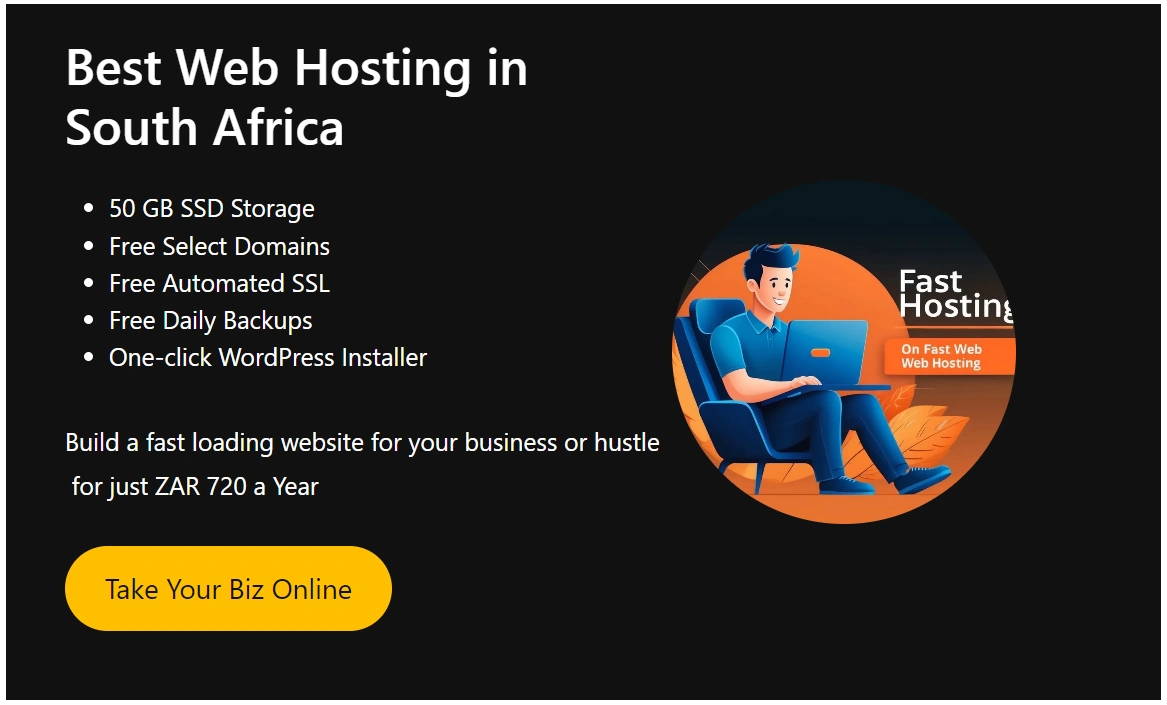In this blog post, we will explore the different types of domains in Zimbabwe and their various use cases better to understand how you can use them.
Table of Contents
What is a domain?
A domain name is essentially the address users type into their browsers to access content on a site.
For example, to use Facebook by Meta, you type ‘facebook.com’ into a browser.
And there are main parts that make up a domain name:
Let’s look at each closely.
Generic Top Level Domains (gTLDs
Generic Top Level Domains (gTLDs) represent one of Zimbabwe’s most popular forms of domain registration.
They are often chosen by businesses, organizations, and individuals looking for a reliable way to secure their own online space.
Examples include:
- com: This is the most well-known and widely used gTLD. It is generally used for commercial websites, such as online stores or business websites.
- .net: Often used for websites related to internet infrastructure or technology. It is also sometimes used by businesses or organizations.
- .org: Traditionally used by non-profit organizations, such as charities or foundations. It is also sometimes used by open-source software projects or community-driven websites.
- .info: This gTLD is often used for websites that provide information on a particular topic or issue. Businesses, individuals, or organizations can use it.
- .biz: Intended for use by businesses, particularly small or startup businesses.
gTLDs are typically the default option when registering any domain name, and they come with an array of benefits.
For starters, they tend to be very affordable and easy to acquire.
They can help give users a unique identity that’s easily recognizable on the web – this is especially important for businesses looking to establish brand recognition.
Not to mention, gTLDs give users more control over their domains, allowing them to customize settings such as DNS records or email forwarding.
With so many advantages, it’s no wonder why gTLDs remain one of the most popular choices among Zimbabwean domain registrants today.
Country-Code Top Level Domains (ccTLDs)
Country-code Top Level Domains, or ccTLDs, are the two-letter domain extensions that identify a country.
In Zimbabwe, the ccTLD is .zw.
Any organization can use a ccTLD to establish an online presence in Zimbabwe and distinguish itself from other organizations in different countries.
Using a .zw domain name helps businesses target customers within their country and build trust with potential customers who may be more familiar with a local domain extension than a global one.
It also adds credibility for businesses trying to stand out among competitors on search engine results pages.
Moreover, a .zw domain makes it easier for visitors to remember when they need to access your website again in the future.
Domain Name
Domain names are the second level of a domain’s hierarchy (after the top-level domain).
In our example of Facebook.com, ‘Facebook’ is the domain name.
Here are other examples (in bold):
- www.truehost.co.za
- https://twitter.com
- www.blogspot.com
Search engines can consider keywords in domain names as a component of their ranking algorithm (such as “where-to-buy-the-best-pizza-in-mutare.com”).
But be mindful when attempting to optimize the root domain for search engines.
Google’s algorithm has been designed to counter these keyword-filled, exact-match domains.
Subdomain
A subdomain is a domain name that is part of a larger domain.
It acts as an individual website but is hosted on the same server as the primary domain.
Subdomains can be used for organizational purposes or to create a unique identity that stands out from the primary domain.
For example, an online store might use shop.examplewebsite.com rather than creating an entirely new website for its store.
Businesses can also use subdomains to create separate identities for departments or areas within their main business, such as blog.examplewebsite.com or support.examplewebsite.com.
This allows each section to have its look and feel while still being under the umbrella of the parent company website and brand identity.
Root Domain
The term “root domain” was initially used regarding DNS (domain-name-servers).
It typically refers to the combination of a unique domain name and a top-level domain (extensions) to form a complete “website address.”
Examples:
- Truehost.co.za
- freelancian.co.za
- techandbutter.com
This root domain is the highest page in the website’s hierarchy, usually the homepage.
Other pages or subdomains can be built off the root domain, but each page URL must include the same root domain to be part of the website.
Internationalized Domain Names (IDNs)
This is a type of domain name that can contain characters from different languages or scripts.
IDNs are becoming increasingly popular worldwide, with many registrars now offering them for free or at discounted rates compared to regular domains.
IDNs can allow Zimbabwean businesses to reach global audiences, as they allow websites and email addresses to be written in local languages.
This can make it easier for international customers to understand what a company is offering while also making it more accessible and relatable.
For example, a Zimbabwean business selling arts and crafts could set up an IDN like “ngozimhande” which uses Shona characters.
The Domain Name System (DNS)
It is not enough to know types of domains in Zimbabwe.
You need to understand DNS as well.
Domain Name System (DNS) is like a phone book for the internet.
Just like you might look up someone’s phone number in a phone book, your computer can look up the address of a website using DNS.
Here’s how it works:
When you type a website’s address (like www.example.com) into your web browser, your computer sends a request to a DNS server asking for the address of that website.
The DNS server looks up the address and sends it back to your computer, which then connects to the website’s server and asks it to send the website’s content.
The website’s server then sends the content back to your computer, which displays the website on your screen.
DNS servers are really important because they help your computer find websites quickly and easily.
Without DNS servers, you would have to remember the numerical address of every website you want to visit, which would be really hard to do!
Final Thoughts
It’s important to understand that each domain serves a specific purpose and many use cases exist.
For example, .co.zw is used for commercial websites; .org.zw is reserved for non-profit organizations; and .ac.zw is used by academic institutions and universities.
Additionally, other domains like .gov.zw and .net.zw are popular among government agencies and network providers respectively.
All these domains help give Zimbabwean businesses an online presence that can be trusted as well as provide customers with the assurance that they are dealing with a legitimate organization or business entity from the country.
Related:


